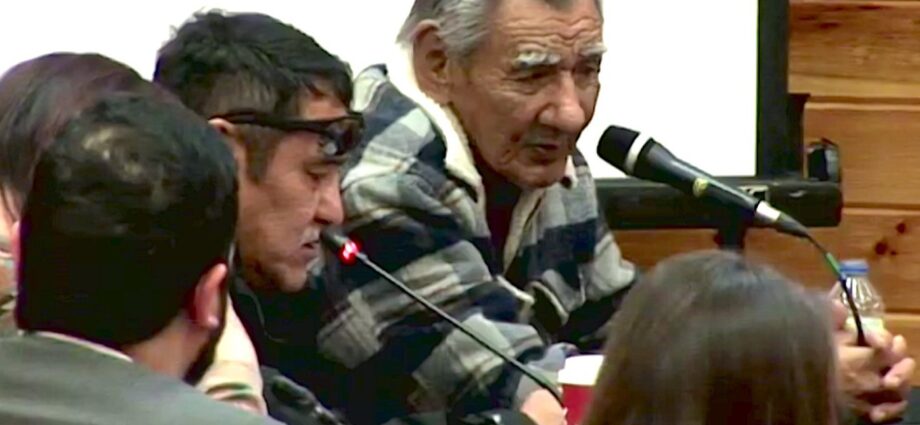
By Peter Jackson, Local Journalism Initiative Reporter, The Telegram
February 18, 2023
The inquiry into the Innu experience in Newfoundland and Labrador’s child-protection system heard further testimony Wednesday, Feb. 15, from elders about how colonization created a rift within communities that led to family breakdown and loss of identity.
And in the middle of it all, commissioners were given a short anthropology lesson on one of the lost spiritual practices of the Innu people.
In the morning, Penote Antuan of Sheshatshiu continued to describe the cruelty he experienced as a boy at the Mount Cashel Orphanage in St. John’s.
The structure was torn down in the 1990s after a high-profile inquiry into physical and sexual abuse inflicted on boys by the Christian Brothers who ran the orphanage.
Antuan says he and one other Innu boy lived in fear that they would be caught speaking their native tongue.
“If we were ever caught using our own language, we would be punished,” he said.

The result would be five or six straps on each hand.
“That’s what I call cruel.”
Antuan testified Tuesday that he had lost all sense of his cultural identity by the time he was sent back to his community.
Tragedy of Davis
In the afternoon, the inquiry heard from Joachim Nui of Natuashish who, at 89, is the only remaining elder from either community who maintains the drumming tradition.
Nui spoke of his time in Davis Inlet, both the original coastal community that came into being in the 1920s during a decline in caribou numbers, and the island location established by the Newfoundland government in 1967.
Nui spoke of the community and family breakdown he saw with the imposition of a sedentary existence that was foreign to their nomadic lifestyle.
![Sony PlayStation Store 110 - Sony, [Digital]](https://i0.wp.com/i5.walmartimages.com/asr/5d3e8d52-3525-4e75-b862-10394c67a31c.c3f21de9f6a2f65537248191772f43b3.png?w=1380&ssl=1)
Parents began drinking and children would be left uncared for. Some of the children also turned to alcohol, or to sniffing gas.
“One of the kids was apprehended after he ran away from his mom,” Nui said through a translator.
He said he made a point of instilling traditional Innu values and practices in the children under his care.
“I see a difference when kids are taken and shipped out somewhere — their identity is lost.”
Shaking tents
One tradition that has been lost is the ritual involving a shaking tent.
“I don’t quite know how the shaking tent works, but my father used to tell stories about the shaking tent,” Nui said.
Variations of the shaking tent exist among several North American tribes.
It’s a makeshift tent, usually cylindrical, that would be erected when spiritual advice was needed to overcome obstacles during a hunt or a trek across a river.
The shaman would enter the tent at night and commune with the good spirits. The tent would often bend or shake while this was occurring.
“When the young people go hunting, they are given advice on how to take care of all the animal parts, like the caribou skin and legs,” Nui said.
“If a person doesn’t follow the rules, there’s a chance something bad might happen.”
When did the ritual start to die out? When the priests came in 1927, said Nui.
“The young people were told by the priests that this thing you are doing is the devil’s work,” he said.
The current session of the Inquiry into the Treatment, Experiences and Outcomes of Innu in Child Protection continues until Feb. 23.
Subscribe to our newsletter.
A link to the live-stream can be found on the Facebook site: https://www.facebook.com/InquiryIntoInnuChildrenInCare.


